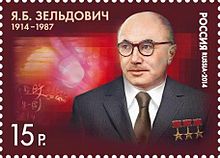Yakov Borisovich Zel'dovich
| Yakov Borisovich Zel'dovich | |
|---|---|
 |
|
| Born | 8 March 1914 Minsk, Russian Empire (Present-day Belarus) |
| Died | 2 December 1987 (aged 73) Moscow, Soviet Union (Present-Day Russia) |
| Citizenship | Soviet Union |
| Fields | Physics |
| Institutions |
Institute of Chemical Physics Moscow State University Sternberg Astronomical Institute |
| Alma mater | Saint Petersburg State University |
| Notable students |
Rashid Sunyaev |
| Known for |
Soviet atomic bomb project Sunyaev-Zel'dovich effect Zel'dovich Mechanism Theory of Nuclear Chain Reactions Astrophysics and Cosmology |
| Notable awards |
Order of the October Revolution (1962) Orders of the Red Banner Dirac Medal (1985) |
Rashid Sunyaev
Roman Juszkiewicz
Igor Dmitriyevich Novikov
Sergei Kopeikin
Sergei Shandarin
Alexei Starobinsky
Varun Sahni
Yakov Borisovich Zel'dovich ForMemRS (Belarusian: Якаў Барысавіч Зяльдовіч, Russian: Я́ков Бори́сович Зельдо́вич; 8 March 1914 – 2 December 1987) was a prolific Soviet physicist born in Belarus. He played an important role in the development of Soviet nuclear and thermonuclear weapons, and made important contributions to the fields of adsorption and catalysis, shock waves, nuclear physics, particle physics, astrophysics, physical cosmology, and general relativity.
He was born to a Jewish family in Minsk (now Belarus). Four months later his family moved to Saint Petersburg. They remained in that city (known as Leningrad from 1924–1991) until August 1941, when together with the institute where Zel'dovich worked, they were evacuated to Kazan to avoid the Axis Invasion of the Soviet Union. They remained in Kazan until the summer of 1943, when Zel'dovich moved to Moscow. Despite being raised in a Jewish family, he later on became an atheist. In May 1931, at age seventeen, Zel'dovich became a laboratory assistant at the Institute of Chemical Physics of the USSR Academy of Sciences. He was associated with the Institute until the end of his life. In 1936 he defended his dissertation, which was on the adsorption and catalysis on heterogeneous surfaces, for his Candidate of Science (equal to PhD). The most important point of it was the research on the Freundlich (or classical) adsorption isotherm. Zel'dovich discovered the theoretical foundation of this empirical observation. In 1939 he received the degree of Doctor of Science (Physics and Mathematics), the doctor dissertation being on the oxidation of nitrogen. Zel'dovich discovered its mechanism, known in physical chemistry as Thermal NO Mechanism or Zel'dovich Mechanism.
...
Wikipedia
